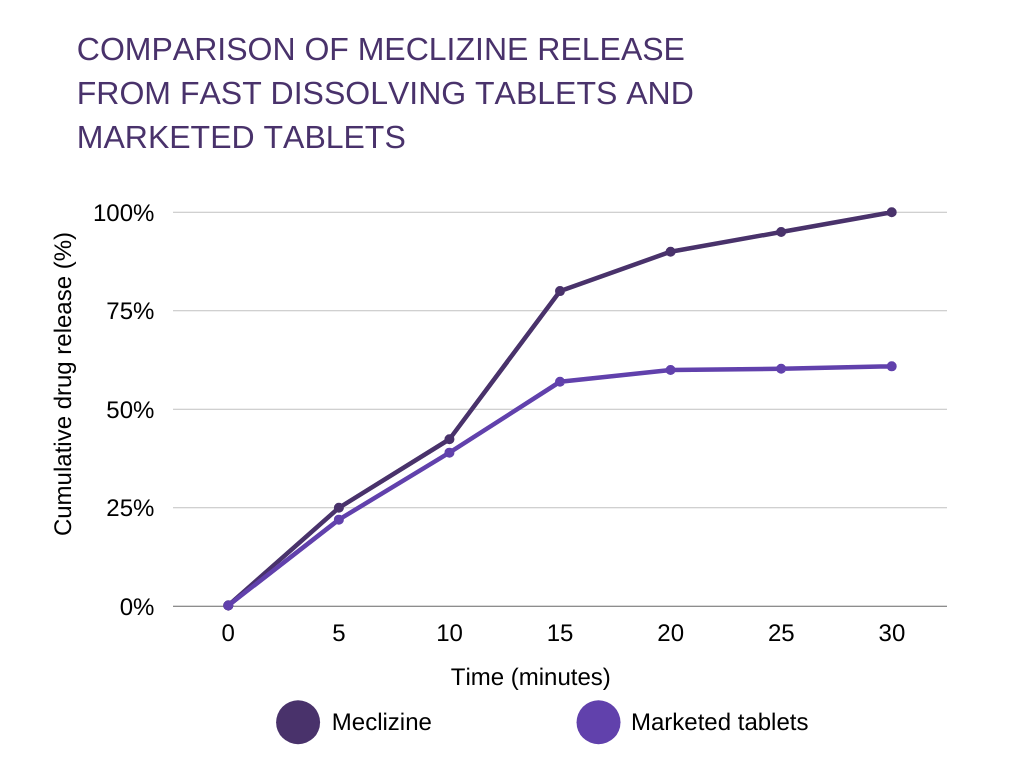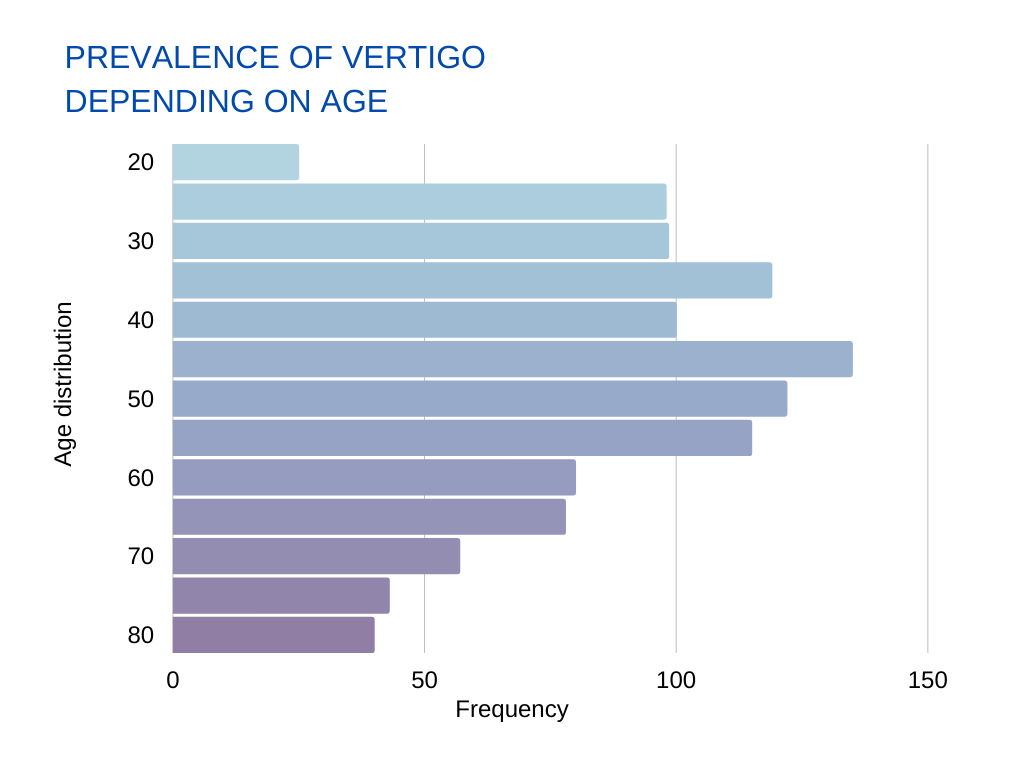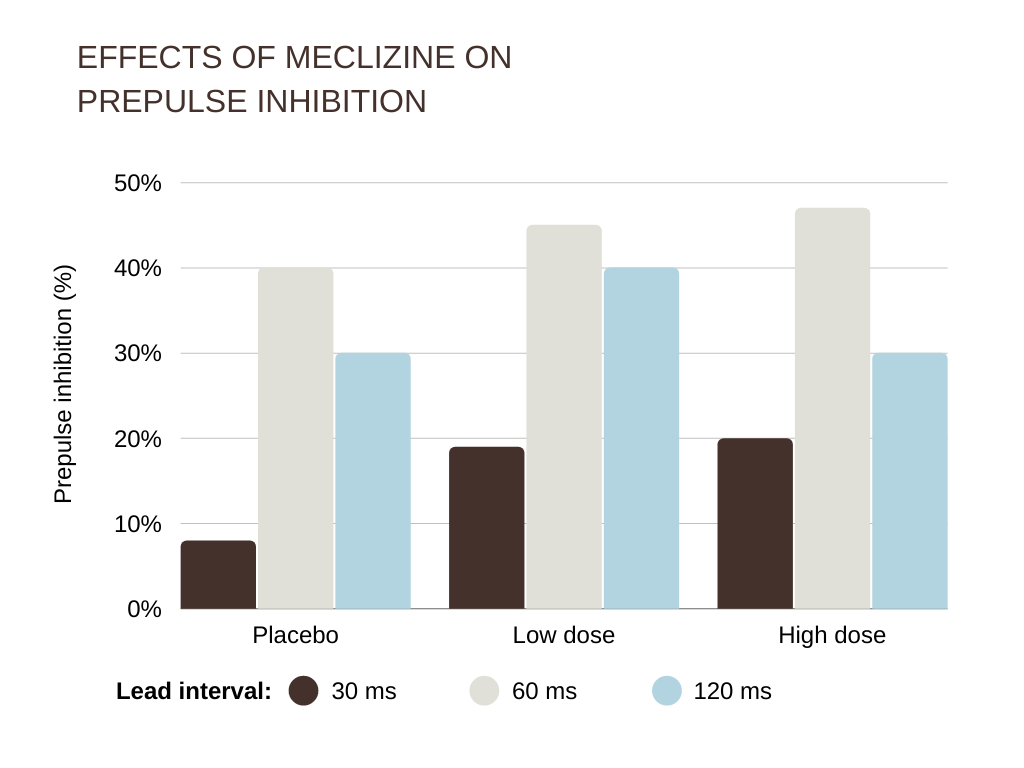Treating vertigo doesn’t necessarily involve particle reposition movements, vestibular rehabilitation exercises, or extensive therapy. Prescription drugs such as meclizine provide adequate and immediate vertigo symptom treatment and effectively curb recurrent episodes.
Moreover, meclizine is a suitable option among the many antivertiginous medications out there. It has fewer side effects and comes as a 12.5 mg chewable tablet, making it easy to swallow. Stick around as you get to know more about meclizine tablets and their critical benefits for combating vertigo.
What Is Meclizine?
Meclizine (Mek li zeen), or meni d, is an oral antihistamine prescription drug used to treat nausea, vertigo, vomiting, and dizziness caused by motion sickness. It comes as a yellow (or pink), round 12.5 mg/25 mg oral tablet, which balances the body’s natural chemical histamine.
Despite being a generic tablet, the medicine meets the approved quality, safety, and effectiveness standards of similar brand-name products.

Meclizine Interactions and Warnings
Meclizine can interact with various everyday medicines and products, causing the medication to be ineffective or lead to strong side effects.
To prevent harmful interactions, always inform your doctor or pharmacist of the medications you’re taking before being prescribed meclizine. If you’re unsure what to avoid, here are some everyday drug interactions and warnings when using meclizine 12.5 mg.
Know the Symptoms of a Meclizine Allergy
While incurring meclizine side effects isn’t a common occurrence, if you show signs of an allergic reaction such as hives, difficulty breathing, lips, tongue, throat, or face swellings, do not hesitate to call your doctor. You may report side effects of meclizine as soon as you experience them to prevent your condition from worsening.
Watch Out for Drowsiness
Meclizine 25 mg oral tablets can cause drowsiness. Avoid driving, operating heavy machinery, or performing any physical activities that require attentiveness as meclizine may cause other side effects such as blurred vision, increasing the risk of accidents.
Notify your doctor as soon as you experience mild drowsiness to receive immediate treatment against other dormant symptoms.
Avoid Alcohol
Limit or stop alcohol consumption while taking meclizine, as it can intensify drowsiness symptoms. This includes wines, spirits, beer, and other alcoholic beverages/foods.
Meclizine Contraindications
Meclizine dosage can worsen current ailments, especially if you experience the following conditions:
- Liver issues: Meclizine 12.5 mg can cause harmful side effects such as hepatotoxicity in people with liver problems as the drug may not process correctly in the body [1].
- Enlarged prostate: Meclizine is commonly contraindicated with people experiencing prostate issues as the drug can make it more difficult to urinate.
- Respiratory ailments: Conditions such as asthma and COPD can significantly worsen with meclizine 12.5 mg (and 25 mg) antihistamine as the drug thickens the lungs’ mucus, making it difficult to breathe [2]. Notify your doctor of any respiratory ailments beforehand to prevent harm.
Medications
Various drug interactions may affect the efficiency of meclizine, leading to an increased risk of adverse side effects. To help prevent this from occurring, here are some medicine and drug interactions to avoid:
- Antidepressants medicine such as paroxetine, diazepam, lorazepam, hydroxyzine, and paroxetine.
- Sleeping pills such as estazolam, suvorexant, zolpidem, triazolam, and doxepin.
- Anti-anxiety drugs such as alprazolam (Xanax), lorazepam, paroxetine, diazepam, clonazepam, and chlordiazepoxide.
- Heart medicine such as digoxin.
- Antipsychotic medicines such as olanzapine, quetiapine, risperidone, chlorpromazine, and haloperidol.
- Allergy medicine such as hydroxyzine, clemastine, diphenhydramine, and carbinoxamine (clistin).
- Muscle relaxers such as methocarbamol, cyclobenzaprine, orphenadrine and baclofen.
Health Conditions
You should not take meclizine 12.5 mg if you have any of the following health conditions:
- Glaucoma.
- Chronic kidney disease (CKD).
- Asthma.
- Enlarged prostate.
- Urination issues.
- Liver disease.
Is Meclizine Safe for Children, Pregnant Women, and Seniors?
Meclizine 12.5 mg products are safe for pregnant women and will not harm the baby [3]. Moreover, a meclizine chewable tablet won’t affect breast milk quality and is safe to consume while breastfeeding.
However, if you feel any side effects, never hesitate to tell your doctor and seek immediate treatment.
The elderly and toddlers are prone to experiencing side effects if not used in caution. Children younger than 12 years shouldn’t take meclizine, as it is yet to be confirmed if it’s safe and effective for premature use.
What Is Meclizine Used For?
Meclizine is used to cure nausea, dizziness, and vomiting symptoms. The medicine is also used to treat inner ear problems affecting a person’s hearing and balance, such as vertigo—read on about ear anatomy here.
This medicine is only available through a doctor’s prescription.
Motion Sickness
1 in 3 people is likely to experience motion sickness (kinetosis) in their life [4]. It is a complex syndrome that causes vomiting and discomfort while driving, sailing, or flying. Side effects you may experience include disorientation and dizziness, depending on medication contraindications.
What Does Meclizine Do for Motion Sickness?
A meclizine chewable tablet works by blocking the signals in the inner brain, triggering nausea, vomiting, and giddiness during travel. The drug is fast-acting and can be taken an hour before traveling, lasting 5 to 6 hours.
However, the 12.5 mg and the 25 mg chewable tablet potency varies; therefore, notify your doctor before traveling so they may create a suitable dosing schedule for your itinerary.
Vertigo
Vertigo is a spinning sensation that causes one to feel as if the environment is moving. This condition can make it challenging to maintain balance and mobility.
Which group do you think is most prone to Vertigo?


What Does Meclizine Do for Vertigo?
Meclizine is used to alleviate vertigo by decreasing neuron excitability in the vestibular part of the brain. This region is responsible for the motion and balance sensations, leading to nausea symptoms caused by vertigo. If you experience issues while taking meclizine, you may report the side effects to the FDA (Food and Drug Administration). You may report severe reactions, product failure, therapeutic inequivalence, and quality issues. More natural approaches to treating vertigo include ear candling—learn how to do ear candling and whether it’s safe here.Meclizine for Dogs
Meclizine is used to help combat kinetosis in pets, which often stems from the fear of boarding vehicles in dogs. Unlike humans, dogs must consume minimal doses of 2-6 mg per body weight (kg). Dog owners may miss a dose occasionally as your dogs’ overdosing chances are high. Ensure to read the medication prescription label for more information, advice, diagnosis, or treatment tips in case of an emergency.Meclizine Side Effects
While symptoms vary, some mild side effects of a meclizine tablet include:- Headache.
- Vomiting.
- Blurred vision.
- Dry mouth.
- Coughs.
- Lightheadedness.
- Fatigue/Drowsiness.
What Are the Side Effects of Meclizine 25 Mg?
At a higher dose, meclizine 12.5 mg tablet can contribute to physical symptoms and side effects, such as:- Eyelid swellings.
- Increased heart rate.
- Coughs.
- Chest tightness.
- Itching.
- Skin rashes.
What Happens If You Take Too Much Meclizine?
Like most medicines, it’s essential to familiarize yourself with the drug information before consuming it regularly. If not, you’re likely to experience severe health problems and symptoms such as:- Difficulty breathing.
- Auditory and visual hallucinations.
- Seizures.
- Inconsistent heart rate.
- Sedation.
Meclizine Dosage and How To Use Meclizine
Meclizine dosage will vary depending on an individual’s age, condition, and symptoms. Here are the average dosage recommendations:Meclizine for Vertigo
- Dosage for adults: The recommended dose is 25 mg to 100 mg meclizine per day.
- Dosage for children: Children between 12 to 17 years can consume 25 mg to 100 mg meclizine daily. Doses may be divided throughout the day.
- Dosage for seniors: Due to the high chance of poor liver and kidney function in the elderly, your doctor will likely recommend a lower dose. Speak to your health care provider for advice, diagnosis, or treatment alternatives if your health information proves unfavorable.
Meclizine for Motion Sickness
- Dosage for adults: Initial oral dose should be 25 mg to 50 mg taken an hour before travel.
- Dosage for children: Children over 12 years may consume 25 mg to 50 mg meclizine at least 1 hour before traveling.
- Dosage for seniors: Elder adults above 65 may be required to seek specialized medical advice from a pharmacist before adhering to a meclizine dosing schedule.
How To Take Meclizine
The drug can be taken with or without food, depending on preference. If it’s a chewable tablet, ensure to chew thoroughly before swallowing. Make sure not to exceed the recommended dosage, and ask your doctor if you’re unsure how much you should take daily.Meclizine Storage
- Do not store meclizine 25 mg in damp or moist areas such as in bathrooms, refrigerators, or near water sources.
- Store in room temperature conditions of 68F-78F (20-26C).
- Keep away from direct sunlight.
- When traveling, do not store meclizine in your glove compartment or a checked bag during flights.
Can Meclizine Be Taken Long Term?
It is not recommended to take meclizine long-term. It can cause irreversible impairment and even dementia in seniors due to its anticholinergic effect on the brain [6].FAQ
If you’re still contemplating the risks, uses, dose, and efficiency of a meclizine 25 mg tablet, here are a few commonly asked questions and related drug information.Can You Get Meclizine OTC?
No, meclizine 25 mg tablet is only available via a doctor’s prescription. However, you can obtain some antihistamine alternatives, such as Dramamine over-the-counter (OTC).Are Bonine, Antivert, and Meclizine HCL the Same Thing?
Yes, they are as Bonine (meclizine hydrochloride), Antivert (meclizine HCL), and meclizine HCL (brand name Antivert) is the same chemical compound. However, Antivert has different side effects, such as constipation which is not found in Bonine or meclizine HCL. Bonine is available as an over-the-counter drug, while meclizine HCL and Antivert are available through prescriptions.What Are Meclizine Alternatives?
In case you may be experiencing strong side effects with meclizine medication, ask your doctor for more advice, diagnosis, or treatment options to reduce the effects. Here are a few notable alternatives that help alleviate nausea, vomiting, and dizziness:- Dramamine.
- Phenergan.
- Scopolamine patches.
- Promethazine.
- Gravol.
- Reglan.
- Ativan.
- Valium.
- Klonopin.
- Zofran.
Does Meclizine Make You Sleepy?
Yes, a meclizine capsule can make you feel sleepy and tired. The impact may vary depending on the dose and your age. Adults and seniors are susceptible to feeling sleepier than teens and youth. Other external influences, such as alcohol, may also increase the effect causing more fatigue.Is Meclizine a High Risk Medication?
No, it is not considered a high risk drug. Meclizine 25 mg tablet has an optimal therapeutic index and poses a low risk when administered wrongly compared to high risk medicines such as insulin, heparin, antimicrobials, and anticoagulants. In excess, side effects may be life-threatening if you are allergic to the ingredients. Always seek medical assistance even if you feel minor symptoms to help prevent your condition from worsening.Can Meclizine Be Used for Anxiety?
Yes, meclizine drugs can be used to treat anxiety and are FDA approved. It works by combating anxiety symptoms such as lightheadedness and nausea, common in mild anxiety and anxiety attacks.
Conclusion
Dealing with motion sickness or vertigo can be disconcerting, especially if you’re experiencing nausea and vomiting symptoms. Meclizine drug is an oral antihistamine tablet that aims to make traveling more manageable without hindering your daily life. Like most medicines, you may experience more side effects depending on your age, medical condition, and dosage. It is advisable to stick to your medication guide to minimize the chance of feeling adverse effects. Meclizine can be life-changing with adequate use—guaranteeing better cognitive and balance responses devoid of vertigo symptoms.References:
- 16]., Jan. “Meclizine.” LiverTox: Clinical and Research Information on Drug-Induced Liver Injury [Internet]., U.S. National Library of Medicine, 16 Jan. 2017, www.ncbi.nlm.nih.gov/books/NBK547895.
- “Adult-Gerontology Nurse Practitioner Certification Intensive Review, Third Edition.” Google Books, Google, books.google.ch/books?id=eX8wDwAAQBAJ&pg=PA667.
- Houston, Bobby T. “Meclizine.” StatPearls [Internet]., U.S. National Library of Medicine, 29 Nov. 2020, www.ncbi.nlm.nih.gov/books/NBK560645.
- “Motion Sickness: MedlinePlus Genetics.” MedlinePlus, U.S. National Library of Medicine, 18 Aug. 2020, medlineplus.gov/genetics/condition/motion-sickness.
- “Vertigo-Associated Disorders: MedlinePlus Medical Encyclopedia.” MedlinePlus, U.S. National Library of Medicine, medlineplus.gov/ency/article/001432.htm.
- H. Shmerling, Robert. “Could Medications Contribute to Dementia?” Harvard Health Blog, 11 Nov. 2020, www.health.harvard.edu/blog/could-medications-contribute-to-dementia-2018052313872.






Leave a Reply